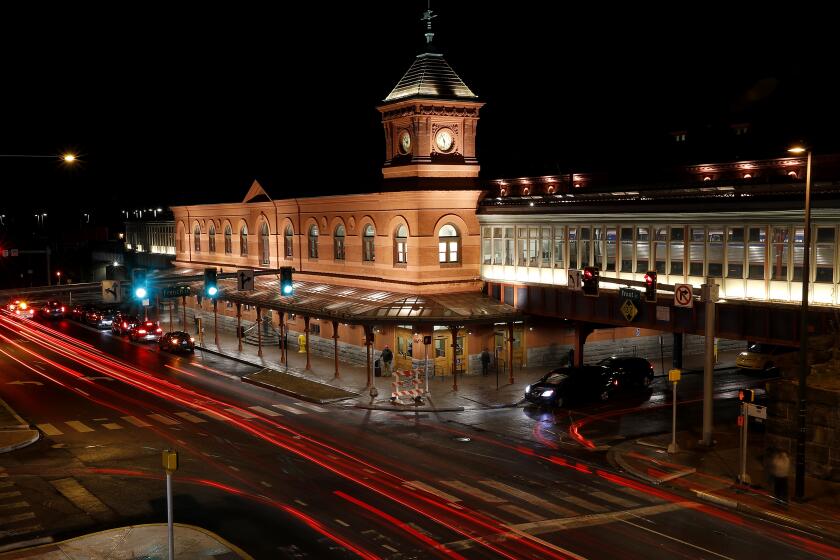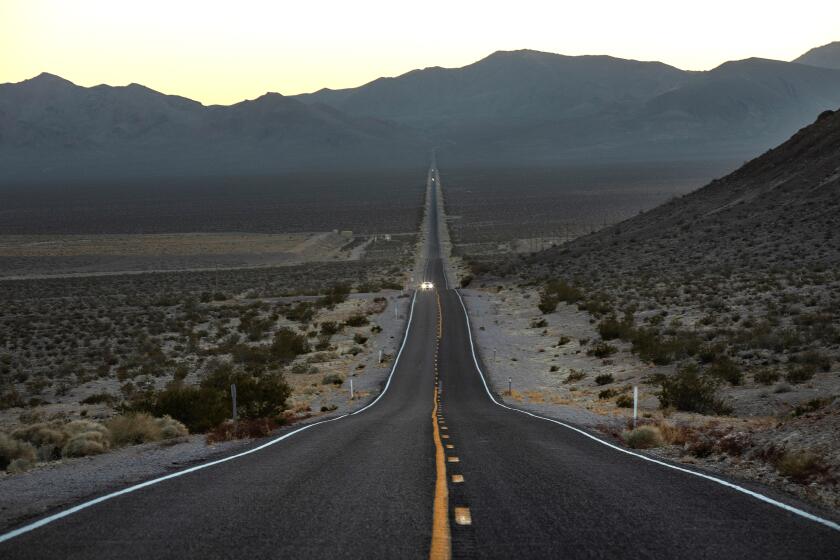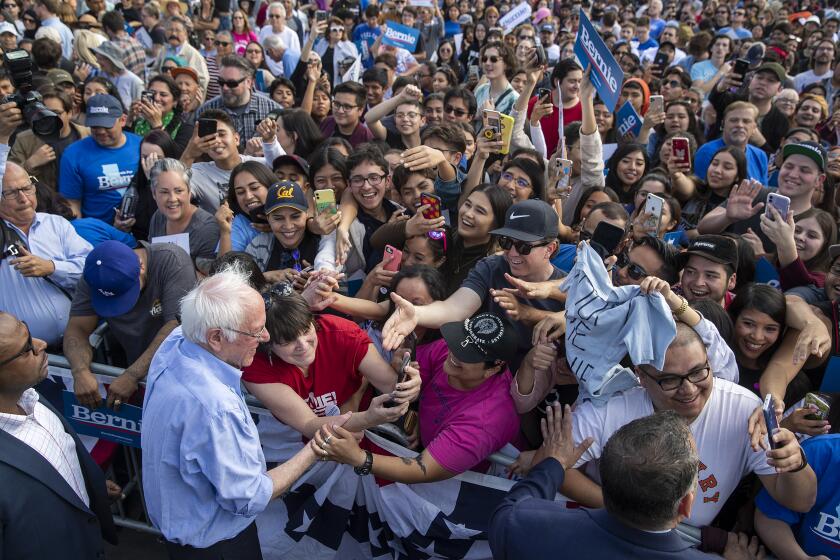Bernie Sanders wins Nevada caucuses, with Joe Biden running a distant second
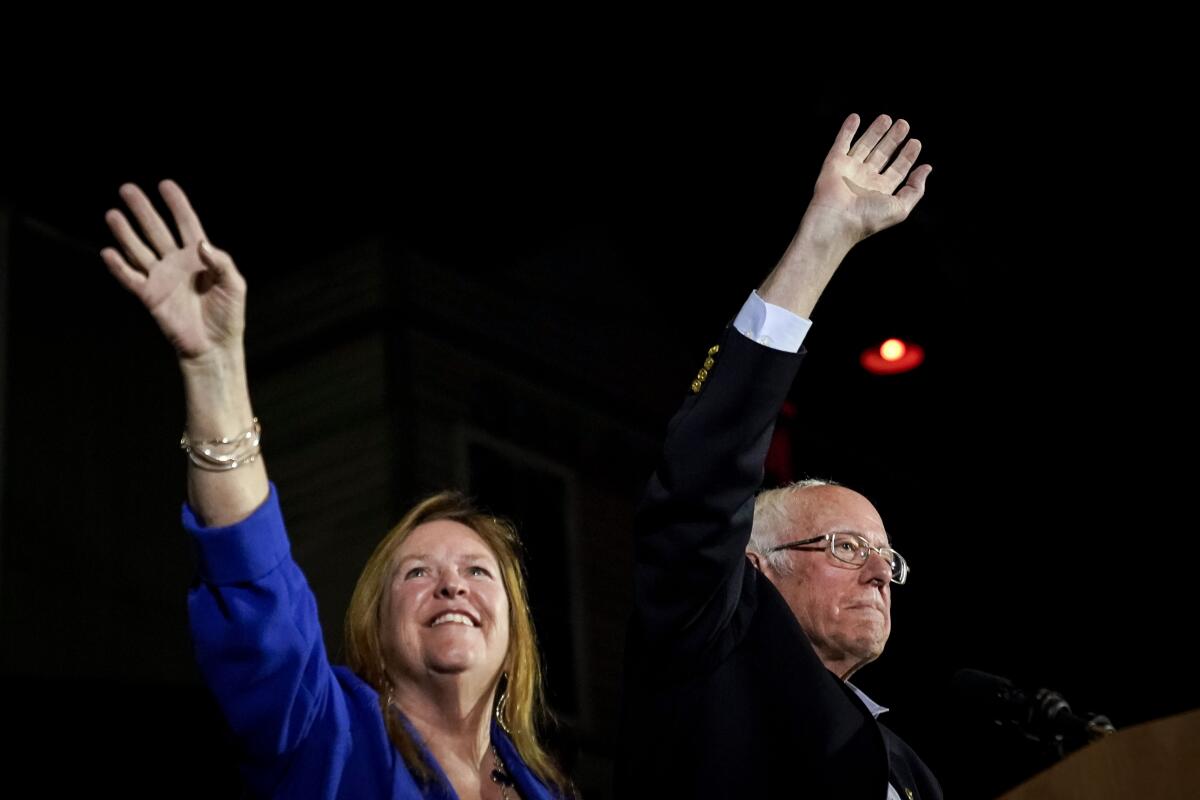
- Share via
LAS VEGAS — Bernie Sanders won a commanding victory in the Nevada presidential caucuses Saturday, marshaling a broad multi-ethnic coalition to solidify his stance atop the still-large Democratic field.
While Sanders’ victory was no surprise — the Vermont senator was the heavy favorite to prevail — his huge margin and depth of support delivered a strong jolt of momentum after two less than overwhelming top-tier finishes.
Former Vice President Joe Biden was running a distant second, setting up a high-stakes competition next Saturday in South Carolina, where he and Sanders will fiercely compete for black voters poised to usher the winner into a crucial blizzard of balloting on March 3, Super Tuesday.
Sanders — his wife, Jane, at his side — greeted supporters in San Antonio, in anticipation of the Texas primary on Super Tuesday. The crowd cheered wildly and waved blue-and-white “Bernie” signs as Sanders ignored his Democratic rivals and took aim at President Trump.
“The American people are sick and tired of a government which is based on greed, corruption and lies,” Sanders hollered. “They want an administration which is based on the principles of justice. Economic justice, social justice, racial justice and environmental justice.”
Joe Biden’s hometown of Wilmington is known for its small size and relationship-based politics. But just as in national politics, backlash has been brewing against the status quo.
Though they trailed far behind, Sanders’ opponents showed no signs that they planned to quit the race or cede the nomination.
With only a tiny fraction of ballots counted, Biden took the stage in Las Vegas to declare victory, of a sort.
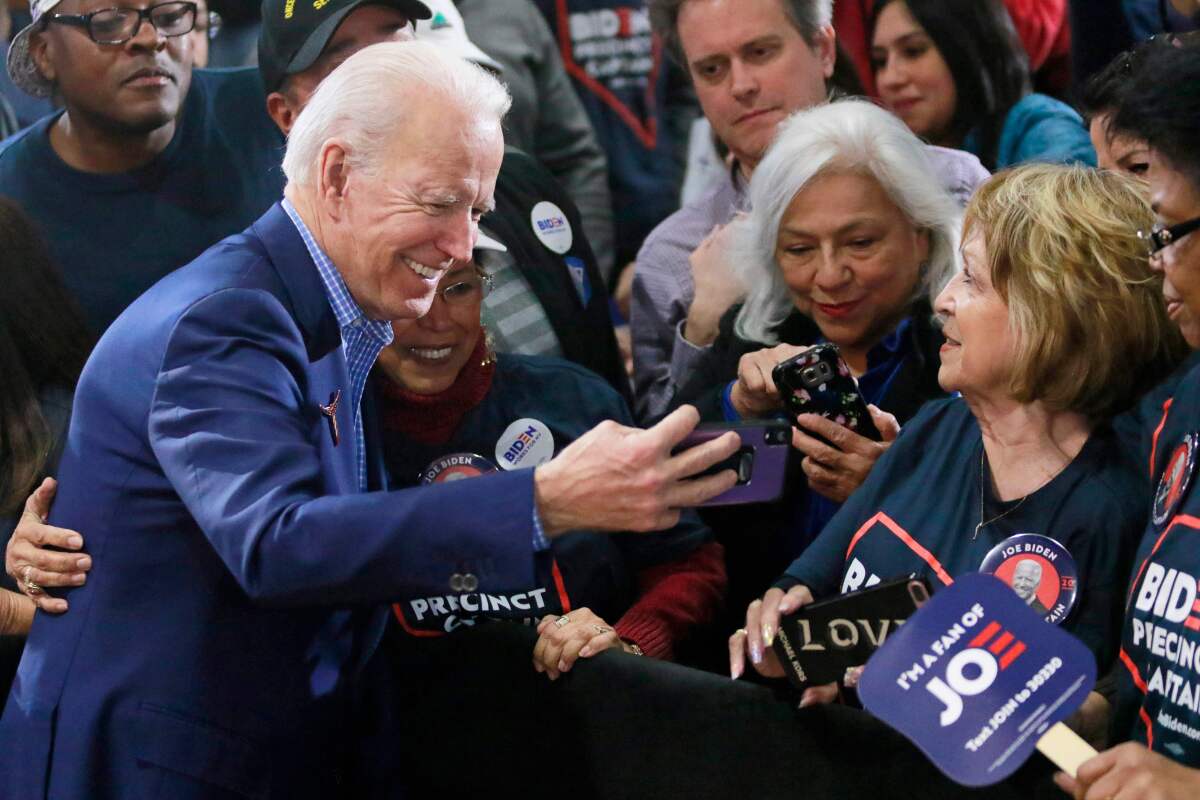
“I know we don’t have the final results yet, but I feel really good,” an exuberant Biden said. “The press is ready to declare people dead quickly. But we’re alive, and we’re coming back and we’re going to win.”
Former South Bend, Ind., Mayor Pete Buttigieg, who tied Sanders in the Iowa caucuses and finished a close second in the New Hampshire primary, used his remarks to lace into the Democratic front-runner.
“Before we rush to nominate Sen. Sanders in our one shot to take on this president, let us take a sober look at what is at stake for our party, for our values and for those with the most to lose,” said Buttigieg, who was in third place.
Sanders “believes in an inflexible, ideological revolution that leaves out most Democrats,” Buttigieg asserted, “not to mention most Americans.”
Speaking at a Seattle rally and looking at the prospect of a fourth-place finish, Sen. Elizabeth Warren said, “We have a lot of states to go, and right now I can feel the momentum, so let’s stay in this fight.”
Sanders was a strong favorite in Nevada given his ardent following among younger voters and Latinos as well as residual support from his 2016 White House bid.
But his victory went much further than that.
The 78-year-old senator not only won the youth and Latino vote by crushing margins, according to entrance polls, but he also carried white voters, those with and without college degrees, male and female voters and caucusgoers of every ideological stripe.
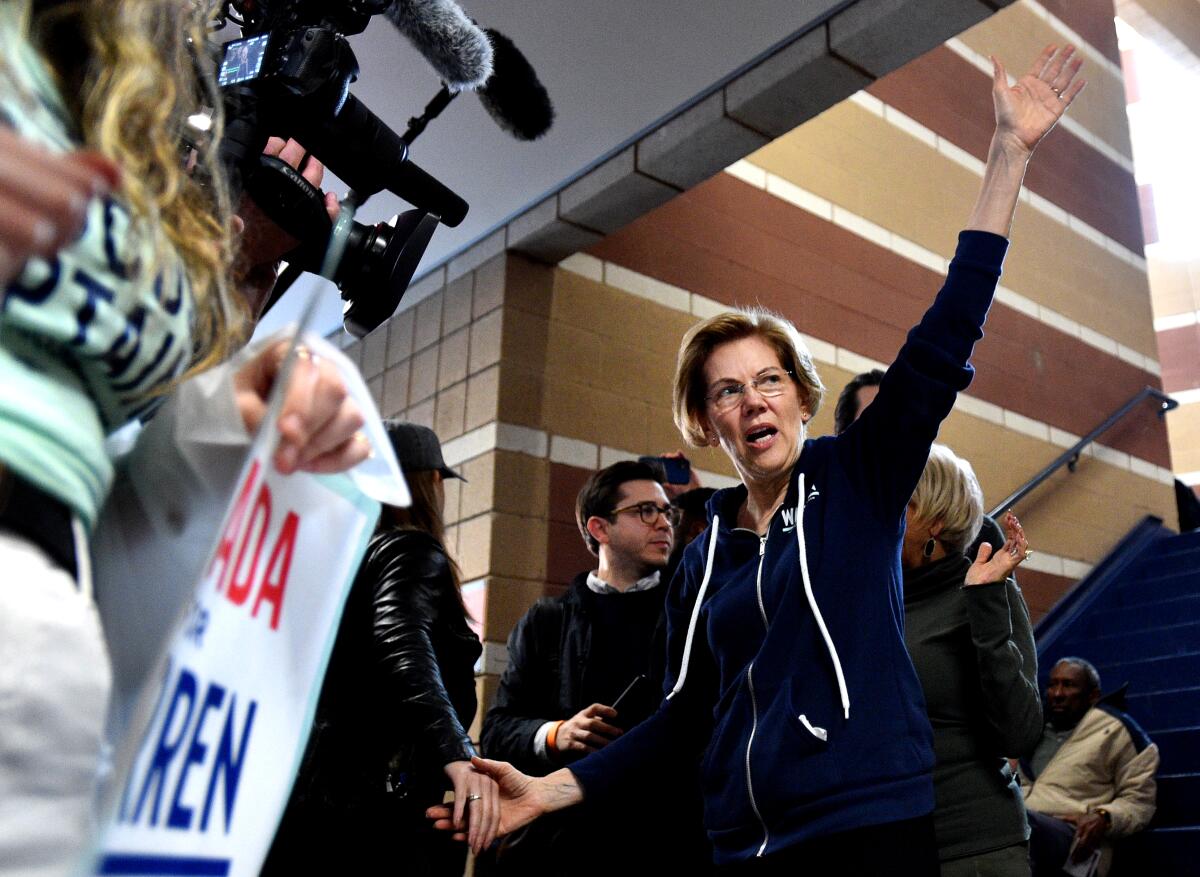
Chris Winchester, a 23-year-old casino card dealer, backed Sanders after his first choice, self-help author Marianne Williamson, dropped out several weeks ago.
“I just think that power needs to be given back to the people,” said Winchester, who caucused for Sanders at a community center in East Las Vegas. “It’s time for that, and he stands for every single point that everyone who I feel with common sense has.”
The first-in-the-West contest, the third on the 2020 political calendar, took place strictly on the Democratic side; Republicans canceled their caucuses as Trump glides virtually unopposed to the GOP nomination.
In rapidly urbanizing Nevada, the Democratic caucuses will be the first test of a truly diverse electorate in the presidential nominating contests.
Perhaps no candidate had more riding on the outcome than Biden, whose assertions of electability were damaged after poor showings in Iowa and New Hampshire. With signs that his support was rapidly ebbing, Biden was counting on a turnabout in Nevada to restore the faith of black voters, who had been his staunchest backers and make up well over half of South Carolina’s Democratic electorate.
Entrance poll interviews conducted by Edison Research showed Biden winning more than a third of Nevada’s black vote, but Sanders was not far behind with more than one-quarter support.
Thea Thomas voted for Biden without much enthusiasm but a healthy dose of pragmatism. She cited his decades in elected office, service as President Obama’s vice president and foreign policy expertise. Besides, the 45-year-old computer programmer said, she had her doubts about other candidates.
“His math doesn’t add up,” she said of Sanders’ healthcare and free-college proposals. “And neither does Elizabeth Warren’s.”
With large populations of black, Latino and Asian American voters, Nevada presented candidates with a more challenging and diverse electorate than they faced in overwhelmingly white Iowa and New Hampshire. More than 3 in 10 caucusgoers were people of color, according to entrance polls, with Latinos making up the largest portion of the electorate, at nearly 20%.
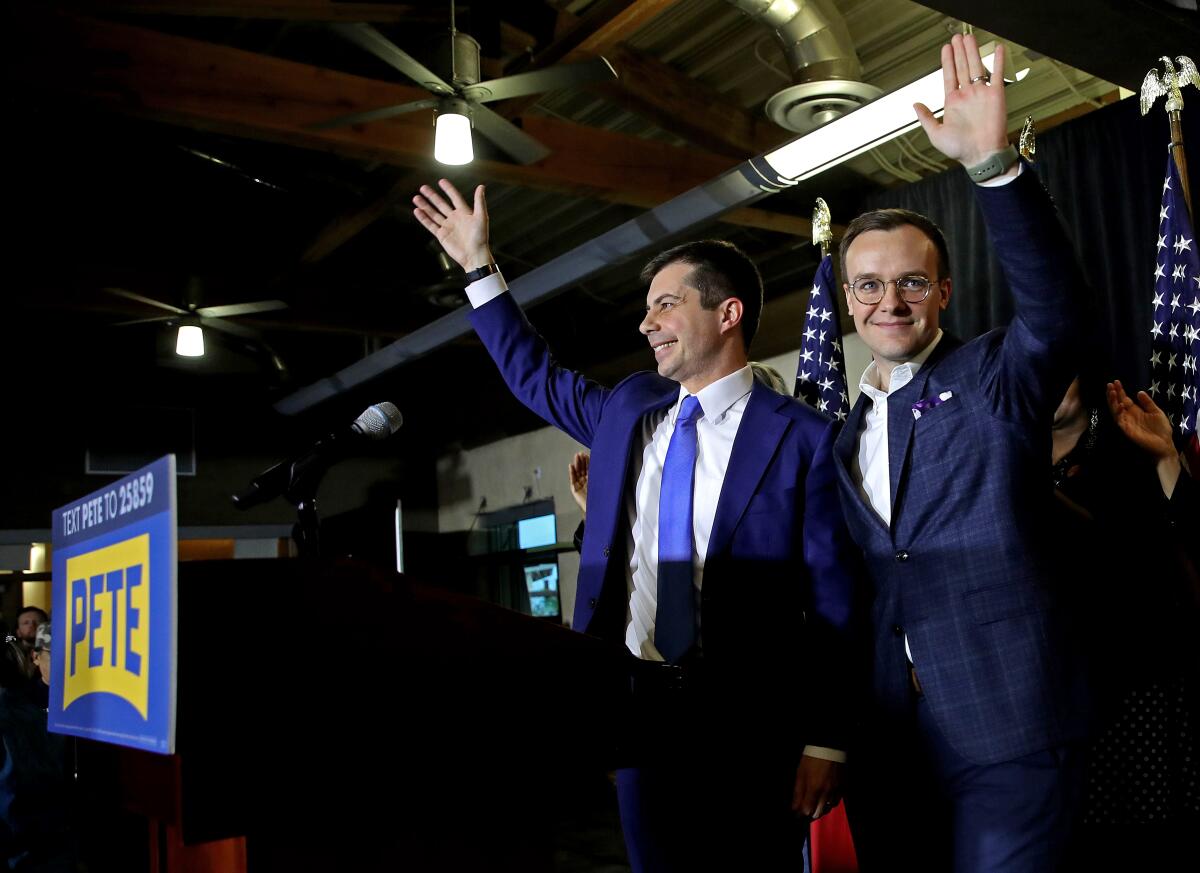
Buttigieg, in particular, was trying to show he could broaden his appeal beyond the more affluent white voters who have been his base of support, but fell well short; he drew only 7% support among Latinos and 2% among black voters.
Warren, who shares many of the same positions as Sanders, failed to benefit much from a fiery debate performance Wednesday night in Las Vegas, perhaps because so many voters had already cast early ballots.
Minnesota Sen. Amy Klobuchar, who placed a surprisingly strong third in New Hampshire, was nowhere near as competitive in Nevada. Still, she told supporters at a home-state rally she had no intention of exiting the race.
“As usual, I think we have exceeded expectations,” Klobuchar said. “I always note that a lot of people didn’t even think I would still be standing at this point.”
Billionaire Tom Steyer, who is richly funding his campaign, finished far back despite vastly outspending his rivals on Nevada’s television airwaves.
Former New York City Mayor Michael R. Bloomberg, who bore the brunt of attacks in his debating debut Wednesday night, was not competing in Nevada, choosing instead to focus on California and 13 other states that vote on March 3.
Nevada is a relative newcomer to the opening phase of the presidential race, holding its early caucuses only since 2008. (By contrast, New Hampshire this year celebrated the 100th anniversary of its first-in-the-nation primary.)
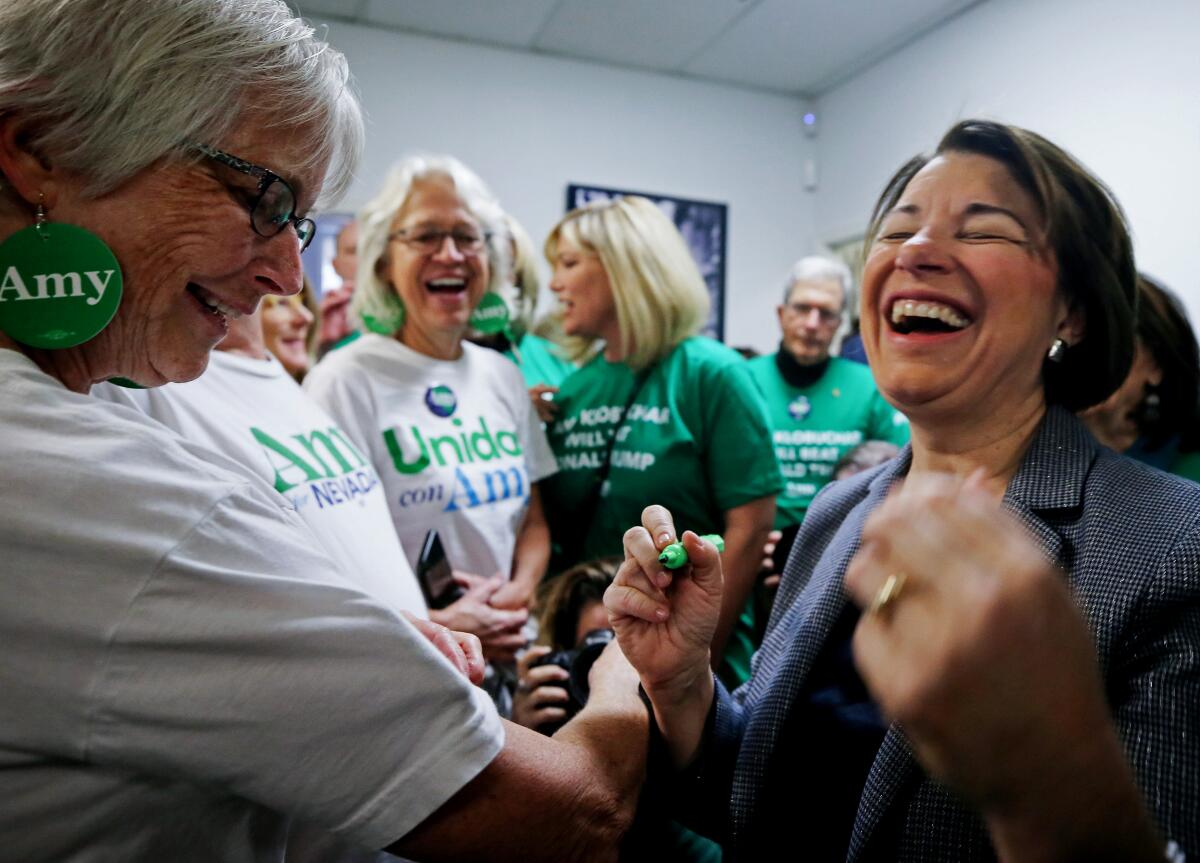
Still, Democrats responded with enthusiasm.
Nearly 75,000 cast ballots during an early-voting window that ended Tuesday, making it virtually certain the overall number will top the 84,000 who turned out four years ago and possibly exceed the record of nearly 120,000 who voted in 2008. That was reassuring to party leaders anxious to see whether the political energy that helped Democrats win control of the House in 2018 has stayed strong.
But that high number also presented complications.
On Saturday, the ranked-choice preference of early voters — who could select up to five candidates — had to be calibrated with those voting in person to determine which candidates achieved either a 15% or 25% viability threshold, depending on the precinct, making them eligible to win delegates.
(The balloting Saturday was part of an attenuated process that will ultimately result in the awarding of 36 pledged delegates to this summer’s Democratic nominating convention.)
The caucuses are run by volunteers, not professional staff or government employees, and party leaders were desperate to avoid the mishaps that left Iowa’s results inconclusive after nearly three weeks. Nevada quickly abandoned the software that had been used in Iowa and instituted other precautions aimed at avoiding a similar fiasco.
Fifty-three percent of Latino voters in California plan to cast their ballot for Bernie Sanders, but not a single member of the powerful Latino Legislative Caucus has backed him.
Despite its early place on the calendar, Nevada has been something of an afterthought for much of the campaign, drawing the full measure of candidates’ attention only after Iowa and New Hampshire voted.
Some top Democrats waited until those results came in before choosing whom to endorse, or deciding not to endorse at all. Among those who stayed neutral were Gov. Steve Sisolak and Harry Reid, the former Senate majority leader and architect of the early caucuses.
Perhaps most consequentially, the Culinary Workers Union — which is 60,000 members strong and a powerhouse in state politics — remained neutral. The union’s leadership did, however, make known its opposition to “Medicare for all,” one of Sanders’ signature proposals and a plan embraced by Warren, fearing its implementation would take away the gold-plated healthcare benefits the union spent years negotiating and securing for its members.
Sanders fought back by insisting his plan would not take away workers’ coverage but rather make healthcare better and cheaper for all. His argument appeared to carry weight: He prevailed in 5 of 7 caucuses held along the Strip, where the culinary union wields its greatest clout.
Barabak reported from Reno and Mehta from Las Vegas. Times staff writers Michael Finnegan in Los Angeles and Melissa Gomez in Las Vegas contributed to this report.
More to Read
Get the L.A. Times Politics newsletter
Deeply reported insights into legislation, politics and policy from Sacramento, Washington and beyond. In your inbox twice per week.
You may occasionally receive promotional content from the Los Angeles Times.


